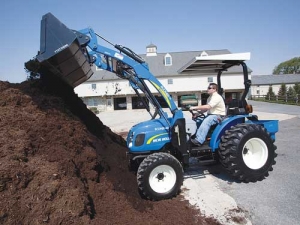The rise in the number of families moving to the country and buying lifestyle blocks was always going to be good for the agricultural machinery industry.
With a lot of the older smaller tractors such as the TE 20, the MF 135 and the Ford 3000 gone to Fiji or re-invented as boat tractors, there are not enough, or the price is too high.
The ex-townie wants to look the part now he lives in the country, and he wants his steed to look like those the real farmers use, so welcome to the compact tractor market, made up of tractors less than 50hp that will do all the jobs the newbie can find.
New Holland importer CB Norwood recently launched the new Boomer range at National Fieldays: the Boomer 25, 35 and 50 – 27hp, 38hp and 46hp respectively.
The baby – the Boomer 25 – has a 3-cyl engine of 1300cc, and delivers maximum power at 2700rpm. It is coupled to a 2-stage hydrostatic transmission, with twin pedals for forward and reverse control and offering variable speed from 0-15km/h dependant on position. So no levers to shift, and more important very easy for a novice to drive.
At the rear end the cat 1, three point linkage has a lift capacity of 650kg and the hydraulics can pump out a satisfactory 23L/min of oil through one rear remote. A single speed PTO at 540rpm pushes out around 20hp at the shaft.
The bigger stablemates, the 35 and the 50, use 4-cyl engines of 1800cc and 2500cc respectively. The hydrostatic transmission option carries over, but now with three ranges on offer and a maximum speed of 24km/h. Alternatively, the option of a mechanical transmission gives four speeds and three ranges – 12 forward and 12 reverse speeds on the 35, or an extra fourth range on the Model 50 to give 16 x 16 speeds.
At the back end of the 35 and 50 models, lift capacities are 820kg and 1250kg respectively, and both tractors have hydraulic flow of around 30L/min, so should be well within their capabilities. As one would expect in a category aimed at this particular market, there are accessories such as frontloaders, mid-mount mowers and rear rotary hoes.
All machines are standard with certified ROPS protection that can be folded to work under trees or enter low buildings.
The tractors are designed for easy home maintenance with easy access to all the required daily checks.
The Boomer range also offers peace of mind for the potential purchaser with an industry leading premium warranty of five years or 2500 hours
A further addition to the range is the Workmaster 40 (38hp) which offers a value-for-money package in that the tractor is supplied with a relatively bare specification but can be upgraded to a bespoke specification via the spare parts department.
As one would expect with modern tractors, access to the driver station is via the flat form with controls laid logically to both sides of the seat, and carrying an easily recognisable colour coding for easy recognition and operation.
www.newholland.co.nz


















